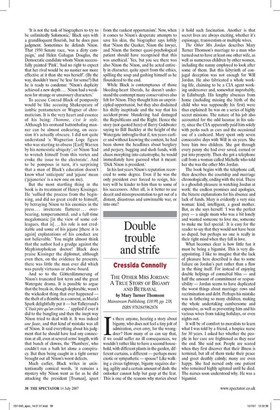Double trouble and strife
Cressida Connolly THE OTHER MRS JORDAN: A TRUE STORY OF BIGAMY AND BETRAYAL by Mary Turner Thomson Mainstream Publishing, £10.99, pp. 238, ISBN 9781845962876 1 s there anyone, hearing a story about bigamy, who does not feel a tiny jolt of admiration, even envy, for the wrongdoer? How many of us can say that, if we could suffer no ill consequences, we wouldn't rather like to have a second household, with different plants in the garden, different curtains, a different — perhaps more exotic or sympathetic — spouse? Like walking a circus tightrope, bigamy requires daring, agility and a certain amount of dash: the onlooker cannot help but gasp at the feat. This is one of the reasons why stories about it hold such fascination. Another is that secret lives are always exciting, whether it's espionage, transvestism or multiple wives.
The Other Mrs Jordan describes Mary Turner Thomson's marriage to a man who turned out to have at least one other wife, as well as numerous children by other women, including the nanny employed to look after some of them. But this labyrinth of conjugal deception was not enough for Will Jordan. He also fabricated a whole working life, claiming to be a CIA agent working undercover and, somewhat improbably, in Edinburgh. His lengthy absences from home (including missing the birth of the child who was supposedly his first) were thus explained: he was on a series of highly secret missions. The nature of his job also accounted for the odd lacunae in his salary, since the CIA apparently paid him solely with perks such as cars and the occasional use of a cashcard. Mary spent only seven consecutive days with Will in six years. She bore him two children. She got through every penny she had ever saved, earned or put into property. Then she got a telephone call from a woman called Michelle who told her she was the other Mrs Jordan.
The book begins with the telephone call, then describes the courtship and marriage chronologically, ending with the trial. There is a ghoulish pleasure in watching Jordan at work: the endless promises and apologies, the bizarre explanations for his absence and lack of funds. Mary is evidently a very nice woman: kind, intelligent, a good mother. But, as she says herself: 'I was the perfect prey — a single mum who was a bit lonely and wanted someone to love me, someone to make me feel special.' It is easy for the reader to say that they would not have been so duped, but perhaps no one is really in their right mind when they fall in love.
What becomes clear is how little fun it must be being a bigamist. This is very disappointing. I like to imagine that the lack of pleasure here described is due to some failure on Jordan's part rather than a flaw in the thing itself. For instead of enjoying double helpings of connubial bliss — and half the amount of commitment or responsibility — Jordan seems to have duplicated the worst things about marriage: rows and recrimination and debt. Perhaps his mistake was in fathering so many children, making the whole undertaking cumbersome and expensive, as well as preventing him and his various wives from taking holidays, or even nights out.
It will be of comfort to moralists to learn what I was told by a friend, a hospice nurse for 30 years. I asked her whether the people in her care are frightened as they near the end. She said not. People are scared when they first discover that their illness is terminal, but all of them make their peace and greet deathly calmly; many are even happy. She had nursed only one patient who remained highly agitated until he died. The nurses soon understood why. He was a bigamist.

















































 Previous page
Previous page